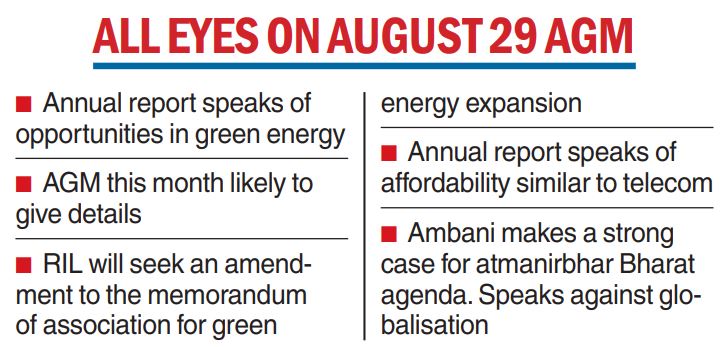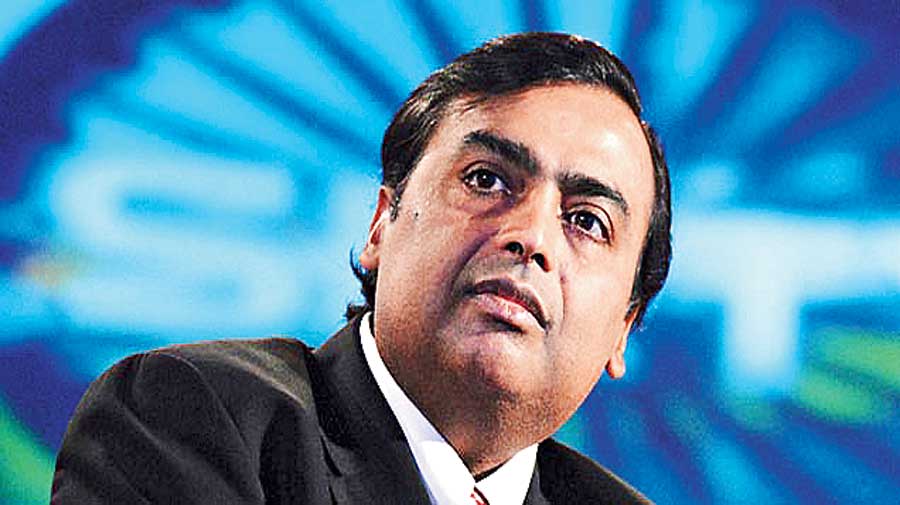Reliance Industries chairman Mukesh Ambani believes that the four-decade-old mantra of globalisation may have started to sputter into irrevelance.
In his latest letter to shareholders of Reliance Industries in this year’s annual report, Ambani has said: “The process of globalisation, which drove the global economic growth over the last four decades, appears to have hit a wall. The cause of economic inter-dependence that globalisation promoted to help align every country’s interests and, thereby, help reduce conflicts, has taken a back seat.”
Ambani reckons that the Ukraine war has led to a rise in geopolitical tensions, exposing the fault lines in the global economy. This has led to a significant dislocation in energy markets and disrupted traditional trade flows, the RIL chairman and managing director said in the letter.
The Reliance group patriarch appeared to make a strong pitch for the atmanirbhar Bharat agenda even as he signalled his group’s mammoth thrust into green energy “with a vision to repeat the feat it (had) achieved in wireless broadband”.

Ambani is expected to spell out the group’s strategy at the annual general meeting to be held on August 29. “Reliance will develop endto-end green energy solutions, which will make clean and abundant energy available to everyone at the most affordable price. Just as India has the world’s most affordable wireless broadband today, we will have the world’s most affordable green energy within this decade. And these solutions will then be exported to other countries, helping them contain carbon emissions.”
Ambani’s localisation drive in green energy is in sync with Prime Minister Narendra Modi’s atmanirbhar Bharat agenda. The company will be seeking shareholders’ approval for an amendment in its memorandum of association before it goes full throttle into the green energy space.
After playing a key role in making India’s data services tariffs among the cheapest in the world, Ambani not only wants to do the same in green energy but also make the country self-sufficient in this sector. “Greater affordability and competitive cost structures will ensure massive adoption of green energy solutions, providing a booster to India’s green energy transition, as well as helping our country to become atmanirbhar’ in our energy needs,’’ he told the Reliance shareholders in the annual report.
He said that RIL’s huge investments in green energy will result in the new growth engine outpacing all other businesses over the next 5-7 years. Ambani disclosed that RIL has entered into a series of partnerships, including equity investments, with local and international companies with unique technological and execution capabilities.
These include companies such as Ambri in the US, Faradion in the UK and The Netherlands-based Lithium Werks. Similarly, Reliance invested in Germany’s NexWafe, which is a pioneer in nextgen technology to produce monocrystalline silicon wafers needed in making solar panels. It also acquired promoters’ stake in REC Solar — a global technology leader in solar panel manufacturing.
On the other hand, in the energy storage space it has began work on the four giga-factories at Dhirubhai Ambani Green Energy Giga Complex at Jamnagar. This unit will have a world-scale production capacity for solar panels, energy storage systems, electrolysers and fuel cells spread over 5,000 acres. RIL further said it has invested Rs 30,000 crore (around $3.76 billion) in its retail business and added 2,500 stores, taking the total store count to 15,196 in 2021-22. Besides, Reliance Retail added 11.1 million square feet of warehousing space during the year, nearly doubling the warehousing space to 22.7 million square feet.











